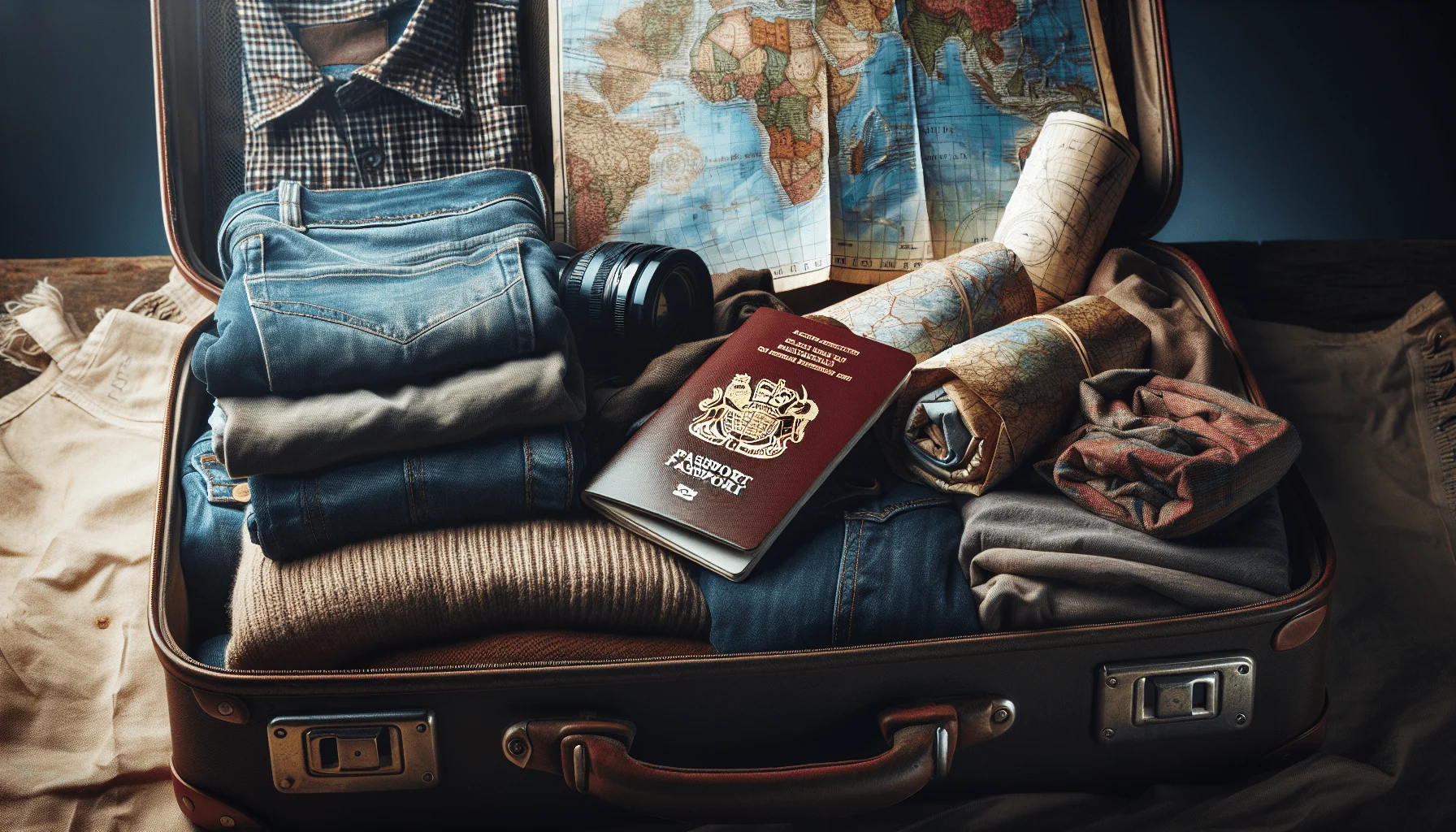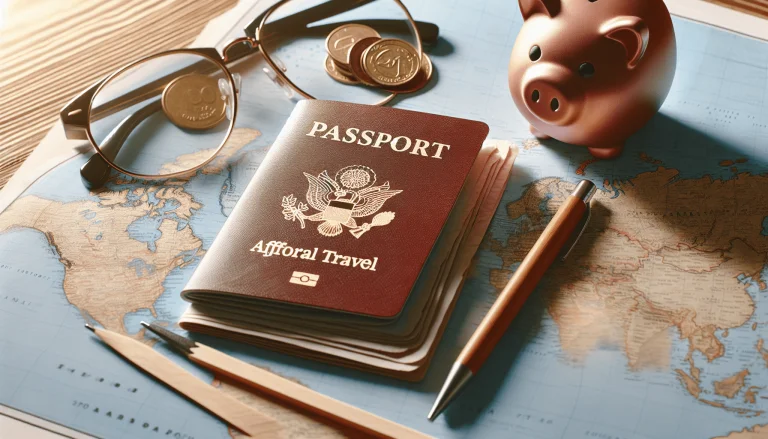How To Travel On A Budget
Planning a trip can be an exciting and rejuvenating experience. However, the biggest obstacle that often stands in the way is the cost. But fear not, for this article is here to guide you on how to travel on a budget without compromising on the fun and adventure. From finding affordable accommodations to exploring budget-friendly destinations, you will discover a myriad of practical tips and tricks that will help you make the most of your travel experience, all while keeping your wallet happy. So pack your bags and get ready to embark on a memorable journey without breaking the bank.
Choosing Your Destination Wisely
When planning a budget-friendly trip, one of the first things to consider is the cost of the destination. Researching cost-effective locations is essential to ensure that your money goes a long way. Look for countries where the cost of living is relatively low, such as countries in Southeast Asia, Eastern Europe, or South America. These places often offer affordable accommodations, transportation, and food options, allowing you to stretch your travel budget.
In addition to researching cost-effective locations, consider traveling during off-peak seasons. Peak seasons typically mean higher prices for accommodations, flights, and attractions due to increased demand. By traveling during the shoulder or low season, you can take advantage of lower prices and potentially find great deals on airfare and accommodations. Plus, you’ll be able to explore popular tourist destinations without having to deal with massive crowds.
Opting for less touristy locations can also help you save money. While popular tourist destinations have their charm, they often come with a higher price tag. Consider exploring less-known destinations that offer unique experiences without breaking the bank. These hidden gems can provide an authentic cultural experience and allow you to interact with locals on a more personal level.
Another factor to consider when choosing your destination is the exchange rate. Finding countries with favorable exchange rates can significantly impact your budget. Look for destinations where your currency holds a strong value, as this can make everything from accommodations to dining out much more affordable. Keep an eye on the exchange rates and plan your trip accordingly to maximize your budget.
Budget Friendly Accommodation
Finding affordable accommodation is crucial when trying to travel on a budget. Fortunately, there are several options that can help you save money. Booking budget-friendly hostels is a popular choice among budget travelers. Hostels offer shared dormitory-style rooms, making them a great option for solo travelers or groups on a tight budget. Many hostels also provide common areas where you can socialize with fellow travelers, creating a vibrant and friendly atmosphere.
Choosing guesthouses over hotels is another way to save money on accommodation. Guesthouses often offer private rooms at a fraction of the cost of a hotel room. While the amenities may be more basic, they can still provide a comfortable and enjoyable stay. Guesthouses also tend to have a more intimate setting, allowing you to interact with the owners and gain insider tips about the local area.
Considering shared accommodation or homestays is another option worth exploring. Platforms such as Airbnb and Couchsurfing offer opportunities to stay with local hosts or rent a room in someone’s home. This not only provides a unique cultural experience but also saves you money on accommodation expenses. Make sure to read reviews and communicate with the host before booking to ensure a safe and comfortable stay.
Taking advantage of loyalty reward programs can also help you save on accommodation costs. Many hotel chains offer loyalty programs that allow you to earn points for each stay. These points can be redeemed for free or discounted stays in the future. If you frequently travel, signing up for these loyalty programs can help you accumulate points and save money in the long run.
Economical Modes of Transportation
Transportation expenses can quickly add up, but there are ways to minimize costs and travel on a budget. Utilizing public transportation is one of the most cost-effective ways to get around. Many cities have efficient and affordable bus or subway systems that can take you to popular tourist attractions and local neighborhoods. Research the public transportation options available in your destination and plan your itinerary accordingly to take advantage of these services.
Taking budget flights is another way to save money on transportation. Budget airlines offer discounted fares, especially when booked in advance or during sales. These airlines may have restrictions on baggage allowance and other amenities, but they can be a great option for traveling long distances without breaking the bank. Be sure to compare prices and read the fine print before booking to ensure you are getting the best deal.
Renting bicycles or walking when possible is not only budget-friendly but also a great way to explore your destination at a leisurely pace. Many cities offer bike sharing programs or have bike-friendly infrastructure, allowing you to cover more ground while enjoying the sights. Walking is free and gives you the opportunity to stumble upon hidden gems and immerse yourself in the local culture. Whenever possible, consider these options and embrace the slower pace of travel.
Sharing rides or carpooling is another way to save on transportation costs, especially when traveling with a group. Platforms like Uber, Lyft, and BlaBlaCar offer options to share rides with other travelers going in the same direction. This helps split the cost of transportation and can be a more affordable alternative to taxis or private car rentals. It’s also a great way to meet fellow travelers and make new friends along the way.
Eating on a Budget
Food is an essential part of travel, and it’s possible to enjoy delicious meals without overspending. Trying local street food is not only a budget-friendly option but also a chance to taste authentic flavors. Street food stalls and markets offer a wide variety of local dishes at affordable prices. Don’t be afraid to venture away from tourist areas and explore where the locals eat. You’ll be rewarded with affordable and delicious meals.
Cooking your own meals, if possible, can save you a significant amount of money. Look for accommodations with kitchen facilities where you can prepare simple meals using fresh local ingredients. Visiting local markets and grocery stores can be a fun cultural experience and an opportunity to sample local produce. Not only will you save money, but you’ll also gain insight into the local food culture.
Avoiding high-end touristy restaurants is crucial for staying on budget. While these establishments may offer a glamorous setting, they often come with inflated prices. Instead, ask locals for recommendations on where to find authentic and affordable meals. Family-run restaurants and eateries away from tourist hotspots often serve delicious food at reasonable prices.
If your accommodation offers complimentary breakfast, take full advantage of it. Starting your day with a filling breakfast can keep you energized and save you money on an additional meal. Whether it’s a continental breakfast or a traditional local spread, savor the complimentary offerings and fuel up for a day of exploring.
Budget Sightseeing
Sightseeing doesn’t have to break the bank. By following some budget-friendly strategies, you can enjoy amazing experiences without overspending. Attending free events is a great way to immerse yourself in the local culture and save money. Many cities offer free concerts, festivals, or cultural performances that provide a window into the local arts scene. Check local event listings, tourist information centers, or online platforms for up-to-date information on free events happening during your visit.
Tracking discounted museum or attraction entry fees is another way to save on sightseeing expenses. Many museums and attractions offer discounted rates on certain days or during specific times. Look for this information on their websites or inquire at the ticket counters. Planning your visits accordingly can help you save a significant amount of money while still enjoying the best cultural and historical experiences your destination has to offer.
Using city sightseeing passes, if economical, can provide access to multiple attractions at a discounted price. These passes often come in the form of a card or booklet and offer free or discounted entry to a variety of attractions, museums, and tours. Before purchasing a pass, make sure to research the included attractions and calculate if it will save you money based on your itinerary. If the pass covers most of your must-see attractions, it can be a cost-effective option.
Exploring nature and outdoor activities is a budget-friendly way to enjoy your destination. Many cities have beautiful parks, gardens, hiking trails, and beaches that offer free or low-cost recreational opportunities. Take advantage of these natural attractions and enjoy the fresh air while admiring the scenic views. Whether it’s a leisurely stroll in a city park or a challenging hike to a mountaintop, these outdoor experiences can be just as rewarding as visiting paid attractions.
Saving on Shopping
Shopping can be a tempting aspect of travel, but it’s important to exercise restraint to stick to your budget. Sticking to essential purchases is key to avoid overspending on items you don’t need. Before making a purchase, ask yourself if it’s something you genuinely need or if it’s just a spur-of-the-moment desire. By focusing on essential items, you can allocate your budget towards more meaningful experiences.
Buying souvenirs from local markets is not only a budget-friendly option but also a way to support local artisans. Skip the high-end boutiques and touristy shops that often charge exorbitant prices for souvenirs. Instead, visit local markets where you can find unique handmade goods and negotiate prices. Not only will you bring back meaningful souvenirs, but you’ll also directly contribute to the local economy.
Avoiding shopping at high-end boutiques is essential for sticking to your budget. While it may be tempting to splurge on luxury items, they often come with a hefty price tag. Focus on the experiences rather than material possessions, and your travel budget will stretch much further. Remember, the memories you create during your trip will last a lifetime, while material possessions may lose their value over time.
Resisting impulse buying is crucial to avoid blowing your budget. Travel destinations are often filled with enticing markets, shops, and malls, but it’s important to stay mindful of your spending habits. Before making a purchase, take a moment to consider if it aligns with your budget and travel priorities. If it doesn’t, it’s best to resist the temptation and redirect your focus towards experiences rather than material possessions.
Pre-Trip Budget Planning
Proper pre-trip budget planning is essential to ensure that you have a clear understanding of your finances and stay on track during your journey. Conducting detailed research and planning is the first step. Calculate the approximate costs of accommodations, transportation, meals, attractions, and other anticipated expenses. Take into account any discounts, special offers, or deals that may be available during your travel dates.
Creating a travel budget is crucial for managing your expenses. Start by listing all anticipated costs and allocate a specific amount for each category. Make sure to set aside some money for unexpected expenses or emergencies. This will help you stay organized and make informed decisions about how to spend your money during your trip. Remember, having a budget doesn’t mean restricting yourself; it’s about being mindful of your spending and making conscious choices.
Tracking your expenses during your trip is essential to ensure that you’re staying within your budget. Keep a record of all your expenditures, either in a notebook or using a budgeting app. This will give you a clear overview of where your money is going and allow you to identify any areas where you may be overspending. Regularly reviewing your expenses will also help you make adjustments as needed and stay on track financially.
Anticipating unexpected costs is an important part of budget planning. While it’s impossible to predict every possible expense, having a buffer for unexpected situations can provide peace of mind. Consider allocating a separate portion of your budget for emergencies or unexpected events. This can help you deal with unforeseen circumstances without derailing your entire budget.
Budget Travel Insurance
Travel insurance is a must-have, even when you’re on a budget. However, that doesn’t mean you can’t find affordable options that still provide adequate coverage. Shopping around for the best rates is crucial to score a good deal on travel insurance. Compare prices from different insurance providers and consider the coverage options they offer. Look for insurance that fits your travel plans and aligns with your budget.
Checking what the policy covers is equally important. Make sure that the insurance policy provides coverage for medical expenses, trip cancellation or interruption, lost or delayed luggage, and other essential components. Read the policy details carefully and ask questions if there’s any confusion. Understanding exactly what is covered will help you make an informed decision and avoid any surprises or gaps in coverage during your trip.
Avoiding unnecessary coverage is essential to prevent overspending on travel insurance. Some insurance policies include add-ons or additional coverage that may not be necessary for your specific trip. Assess your travel needs and choose a policy that covers the essentials without unnecessary extras. By choosing a policy tailored to your needs, you can save money without compromising on coverage.
Using Affordable Communication Means
Staying connected while traveling doesn’t have to be expensive. By utilizing affordable communication means, you can keep in touch with loved ones and access important information without breaking the bank. Using free Wi-Fi hotspots is a budget-friendly option for accessing the internet. Many cafes, restaurants, and public spaces offer free Wi-Fi, allowing you to stay connected without incurring additional charges.
Getting a local SIM card for data is another cost-effective option, especially if you’ll be in the destination for an extended period. Purchasing a SIM card from a local provider gives you access to affordable data plans and allows you to make local calls. Research the available options and compare prices to find the best deal on a SIM card that suits your communication needs.
Using communication apps instead of international calling is a convenient and economical way to stay in touch. Apps like WhatsApp, Skype, or FaceTime allow you to make voice and video calls over the internet for free or at a fraction of the cost of international calls. Make sure to inform your contacts about your preferred communication app before your trip to ensure seamless communication.
Maximizing Credit Card Benefits
Credit cards can be valuable tools for budget travelers when used wisely. By maximizing credit card benefits, you can save money and enjoy additional perks during your trip. Using credit cards with no foreign transaction fees is a smart move to avoid unnecessary charges. These fees can add up, especially if you frequently use your credit card for purchases while abroad. Look for credit card options that offer this feature, and double-check the terms and conditions to ensure there are no hidden fees.
Cashing in on credit card points or miles is another way to save money on travel expenses. Many credit card rewards programs allow you to earn points or miles for every dollar spent. These points can be redeemed for discounted or free flights, hotel stays, or other travel-related expenses. Make sure to familiarize yourself with the rules and restrictions of your credit card’s rewards program to maximize the benefits.
Checking if the credit card offers travel insurance is essential to ensure that you have adequate coverage during your trip. Some credit cards provide travel insurance as a perk, but the terms and coverage may vary. Review the policy details and assess if it meets your needs. If it doesn’t offer sufficient coverage, consider purchasing additional travel insurance to ensure you’re protected in case of any unforeseen circumstances.
Traveling on a budget doesn’t mean compromising on experiences or missing out on the joys of travel. By making informed choices and implementing these budget-friendly strategies, you can create unforgettable memories without emptying your bank account. Remember, travel is about embracing new cultures, connecting with people, and gaining unique experiences. With careful planning and a friendly smile, the world is yours to explore on a budget.







